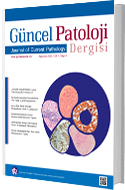2Izmir Katip Celebi University Ataturk Training And Research Hospital, Department Of Gastroenterology
Introduction: Endometriosis is a disease in which endometrial glands and stroma are implanted outside the uterine cavity. Gastrointestinal involvement occurs in 3-37% of the cases and the most common site of involvement is the rectosigmoid colon. Correlation of patient history and clinical symptoms in particular clinical state is very important while suspecting the diagnosis. Although histopathological diagnosis remains confirmatory, it causes a diagnostic dilemma for clinicans and pathologists. Especially when there is only stromal component, there are lots of mesenchymal mimickers when it comes to differential diagnosis. In this report, we present a colonic mucosal endometriosis mimicking a mesenchymal lesion.
Case Report: A 65-year-old female patient presented with abdominal pain and rectal bleeding and was referred to our hospital for colonoscopic examination. She had several abdominal operations for multiple endometriotic foci. Colonoscopy revealed a scatricial, fragile and avascularized area which narrowed almost half of the colonic lumen. Biopsies were taken to rule out malignancy with the differential diagnosis' of solitary rectal ulcer and inflammation. Histopathological examination showed monotonous, small round cell infiltration without glandular formation in between hyperplastic mucosal glands under the surface epithelium of the colon. No atypia and mitosis were present. Immunohistochemical studies revealed positive staining with vimentin, CD10, ER, PR, Bcl-2, nestin and negativity with keratin stains, EMA, chromogranin, synaptofizin, CD56, LCA, CD34, CD99, S100, SMA, calponin, CD31, CD117, DOG-1 and CD68. Ki-67 proliferation index was less than %1. Although there was no glandular component, because of the patient’s history and the immunohistochemical findings, we diagnosed the case as colonic mucosal involvement of endometriosis.
Conclusion: Gastrointestinal involvement of endometriosis is rare and it usually affects serosa or muscularis propria. But in some challenging cases, mucosal biopsies may only have stromal component and be misdiagnosed as many different mesenchymal lesions. In colonic lesions that only have mesenchymal appearing cells, endometriosis must be kept in mind in the differential diagnosis.
Anahtar Kelimeler : Endometriosis, colon, mesenchymal lesion

